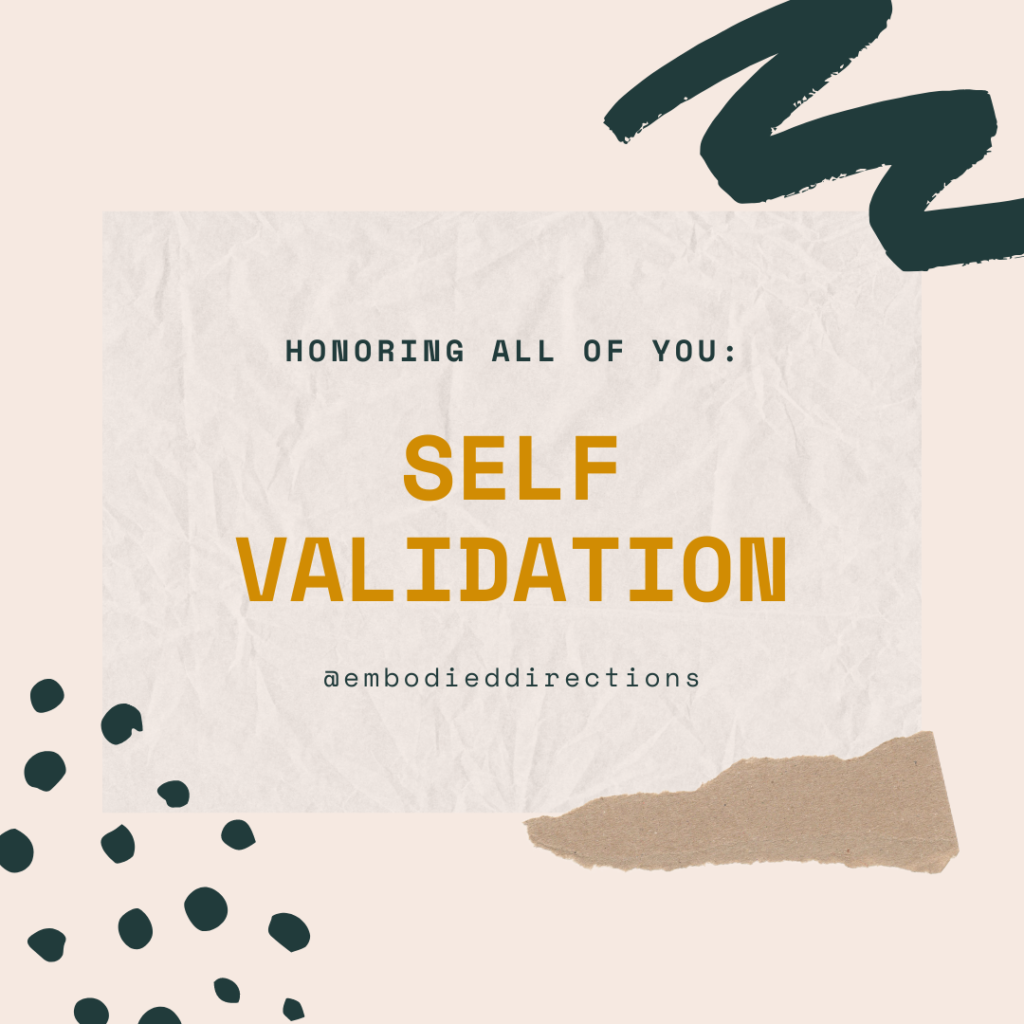Lets start with the foundations
How do you define self-validation? It might look a little different for all of us! Here are some concepts, ideas and definitions to consider.
We’ll start with validation: the feedback we receive from others. Validation doesn’t necessarily mean that there is agreement but it does typically mean there is some understanding and acceptance. This feedback gives us information about being seen, heard, legitimized or recognized.
Self-Validation, then, is giving accurate feedback to ourselves, recognizing our internal experiences and “seeing” all facets of ourselves in any given moment. A practice I like to call Honoring All of You.
It might also be helpful to consider the opposite of validation — non-recognition, criticism or judgment. That ineffective voice calling you names and saying: “you don’t matter”, “I don’t care about you”, “you’re x, y or z….”.
Defining your “why”
If you are interested in exploring self-validation practice more, it might be helpful to identify your “why” so that you can have an intention to come back to. You might reflect for a moment on the question:
“How do I hope practicing self-validation will serve me?”
You might find self-validation useful for:
- Self-Management or regulation
- Emotional tolerance
- To self-motivate
- Gaining self-understanding
- Self-acceptance
- Self-love
- Self-compassion
- Awareness raising
- Self-forgiveness
- Self-identity building / connecting
- Intuition development
- Accessing / finding wisdom
Some practices, steps and skills to consider…

Noticing / observing / practicing presence — being present with your thoughts, emotions, beliefs (aka your inner landscape) is the practice of listening to yourself so that you can experience your inner world. The invitation here is to notice.
Naming what you notice — this involves mindfully spending time inward. You might enter this space with curiosity. Practice being honest & accurate with that you receive. Its okay if you are not satisfied with a certain something. Is there a way you can give yourself feedback that isn’t rooted in a judgment or harsh negativity? Alternatively, investigate what you notice that is working. The invitation here is to describe what you notice.
Lean toward tolerance or acceptance — if its safe for you to do so, let your experience be. I’m talking ANY and ALL experiences here. Easy-to-tolerate ones, uncomfortable or even painful ones and yes, even trauma survival skills (avoiding, distracting or numbing). The invitation is to hold space for literally whatever experience you notice.
Inquire what is needed — I often ask: is there a story or words wanting to be shared when you inquire within? If sensation(s) or emotion(s) you notice had a voice, what would they say? The invitation here is to identify what you need/what could benefit you, based on what is happening in the present moment experience.
Praise / Affirm (not rooted in toxic positivity) — explore language that resonates best with you and know that it can feel disingenuous or awkward if this is a new practice for you. If it feels more helpful, consider what you might say to a loved one in the same situation. You might consider ways to keep your words present and visual (write them on a post-it, turn them into a piece of art work). The invitation here is to find effective language for your self-validation expression; short, easy-to-remember phrases might help.
Celebrate learnings — can we dismantle the concept that celebrating is reserved for “the big things” and “the positive”? What would it look like if you celebrated something painful, because you got through it and learned something? Consider the learnings that happen everyday, along with the accomplishments — all of which are worthy of praise or celebration; small, big, painful, uncomfortable, amazing, powerful, and anywhere in between. *Celebration here is not meant to be boast consumerism (although you might choose to do that sometimes) — the invitation here is to outwardly recognize yourself and what you are learning.
Self validation through effective action — consider the limitless ways to validate yourself through acts of self love — this can be acts toward yourself and/or others, you decide what feels effective! The invitation here is to experience self-validation in a tangible, actionable way.
Stuck, struggling or challenged with this practice? Yes, it will happen!
- Try normalizing — providing some “perspective” for yourself by naming the normalcy of what you notice. For example: “other people experiencing ______, might feel this way too”.
- Use historical information — sometimes our histories will influence our present moment experience. We can honor and validate this occurrence, reflecting that its understandable that this might happen. For example: “is understandable that I am having urges to avoid this confrontation, when I grew up confrontations was scary for me”.
- Make accurate assumptions — yes, we totally have permission to make best guesses when we feel confused, at a loss or unable to name parts of our experience. For example: “how would someone else who is feeling ______ want to be spoken to, soothed or validated? Or “if someone else were in this experience, how might they feel?”.
- Be kind and realistic with yourself — self-validation is a practice and it can evolve to the extent that you want /need. It might be useful expect that at times this practice will be hard, frustrating, out-of-reach or even not the most helpful skill. Its possible your intention *remember above* might serve you in these moments.
Thanks for reading & good luck with your practice! Please take what makes sense and leave the rest.
– Jenni